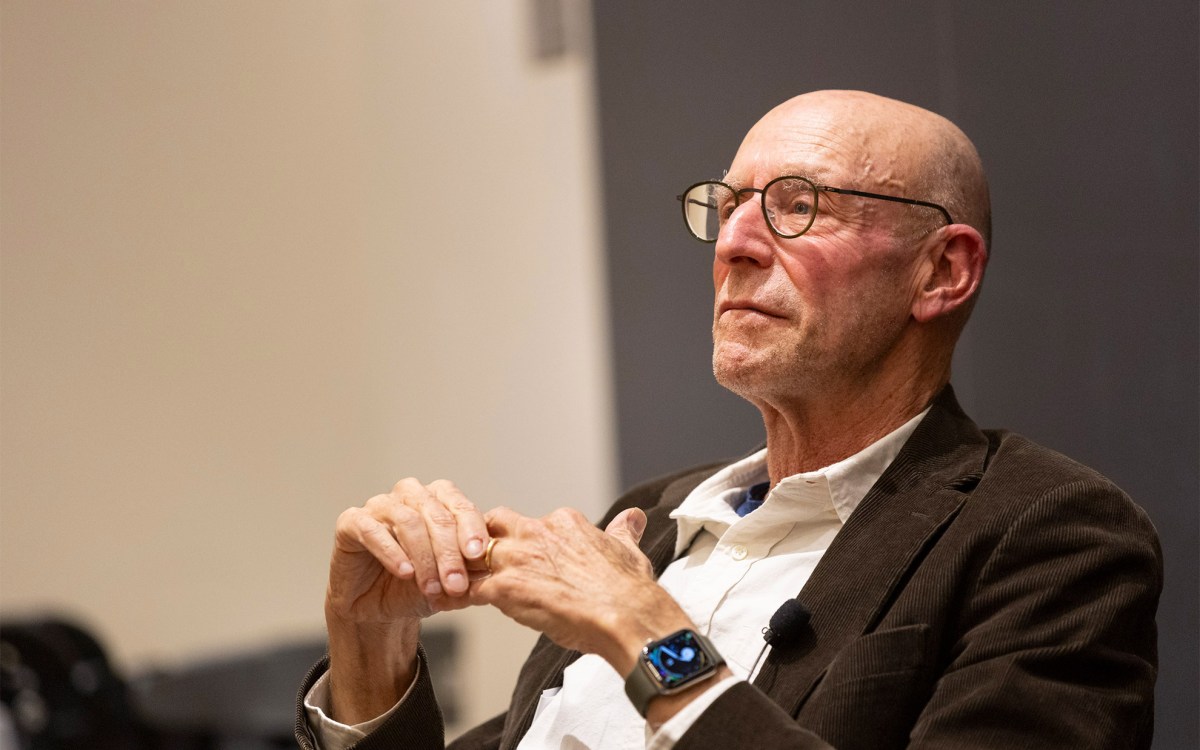All articles
-
Campus & Community
Ambassadors discuss Southeast Europe’s future
A stronger, larger Europe will become a better partner, not a bigger rival, to the United States in international affairs, according to European ambassadors and consuls gathered at the Kennedy School of Government last week (Oct. 15).
-
Campus & Community
One on One: Kerry defends Iraq stance
This is the second in a series of interviews with Democratic presidential candidates.
-
Campus & Community
Weissman International Interns return for 10th anniversary celebration
This past summer, when Claire Porter 05 was rising at 5 a.m. to greet the Ugandan dawn by recording the vocalizations of colobus monkeys, she hardly imagined she was leading a Harvard trend. Delivering babies in rural Mexico, Ashkan Abbey 05 didnt have a broad educational initiative on his mind.
-
Campus & Community
School of Public Health honors Couric
Katie Couric, one of the most recognizable faces on television, accepted an award from Harvards School of Public Health (SPH) Tuesday (Oct. 21) for work that she said is more important to her than her daily interviews with newsmakers and stars.
-
Campus & Community
Newsmakers
LuPone class canceled Due to unforeseen circumstances, the master class with Tony Award-winning actor/singer Patti LuPone on Oct. 24 in Paine Hall at the Department of Music has been canceled.…
-
Campus & Community
CDC awards KSG, SPH with grant
The Centers for Disease Control and Prevention (CDC) has awarded a $250,000 start-up grant to Harvards School of Public Health (SPH) and Kennedy School of Government to develop and establish the National Preparedness Leadership Academy (NPLA). In light of bioterrorist and other terror threats, this university-wide training initiative is geared toward senior government officials with…
-
Campus & Community
Alcohol and Health Committee established
As part of Harvards continuing effort to address issues of alcohol and health that have affected college-age students here and nationwide, Harvards provost and College dean have announced the formation of the Committee to Address Alcohol and Health at Harvard that will work to review all institutional prevention, education, outreach and treatment services to reduce…
-
Campus & Community
In brief
HUHS to present ‘Myths and Realities of Aging’ The Center for Wellness and Health Communication at Harvard University Health Services (HUHS) is sponsoring the second installment of “Myths and Realities…
-
Campus & Community
Re-union
During a first-time-ever labor-management conference of 100 union members and 100 Harvard managers held Oct. 16, former Harvard President Derek Bok and Kris Rondeau, Harvard Union of Clerical and Technical Workers lead organizer, listen to speakers. Union members and managers later broke into groups to discuss the important themes to be addressed during the upcoming…
-
Campus & Community
Police reports
Following are some of the incidents reported to the Harvard University Police Department for the week ending Oct. 18. The official log is located at 1033 Massachusetts Ave., sixth floor.
-
Campus & Community
Elisabeth MacDougall, pioneer in formal study of gardens
Elisabeth Blair MacDougall, an art historian who helped transform the study of gardens into an academic discipline, died Oct. 12. She was 78.
-
Campus & Community
This month in Harvard history
Oct. 17, 1944 – In the “Harvard Service News,” Anthropology Professor Earnest A. Hooton advocates the election of a woman to the U.S. presidency, noting that “the females of our…
-
Campus & Community
Cloistered
Against a backdrop of fall foliage and sunlight, Kirsten McCarthy, GSE degree candidate, studies at Gutman Library.
-
Campus & Community
Creativity tied to mental illness
Ignoring what seems irrelevant to your immediate needs may be good for your mental health but bad for creativity.
-
Campus & Community
President outlines ideas on Allston planning
In an open letter to the Harvard community, President Lawrence H. Summers Tuesday (Oct. 21) outlined a number of programmatic assumptions intended to guide the next phase of the Universitys planning for the eventual long-term use of its properties in Allston.
-
Campus & Community
Harvard Stadium
In 1905, just two years after the completion of Harvard Stadium, President Charles W. Eliot threatened to expel – once and for all – the savage game of football from…
-
Campus & Community
Project finds Hindus in New Jersey, Buddhists in Montana
An influx of new immigrants that began in 1965 when U.S. immigration laws were liberalized has changed our society in ways that contradict traditional assumptions about the correlation of religion…
-
Campus & Community
Low-carb more effective than low-fat
A study put three groups of dieters on different regimens. They included a low-fat group, a low-carbohydrate group that ate the same number of calories, and a third group on…
-
Health
The links between creativity, intelligence, and mental illness
“Scientists have wondered for a long time why madness and creativity seem linked, particularly in artists, musicians, and writers,” notes Shelley Carson, a Harvard psychologist. “Our research results indicate that…
-
Campus & Community
Sissela Bok stalks the notion of happiness
With a title like The Pursuits of Happiness, its no wonder that philosopher and ethicist Sissela Bok packed Science Center C Tuesday night (Oct. 14) for her Lowell Lecture sponsored by the Harvard Extension School: Is there any pursuit more elemental to our existence?
-
Campus & Community
Bishop in a pickup truck
In July 2000, when the Right Rev. Vashti McKenzie was elected the first female bishop in the 213-year history of the African Methodist Episcopal (AME) Church, her reaction made national headlines. The stained-glass ceiling has been pierced and broken, she said after the bishops and elders of her church had placed their hands on her…
-
Campus & Community
Harvard Foundation honors governor of Puerto Rico
For her leadership in government and humanitarian causes, the Harvard Foundation will honor Gov. Sila Calderón of Puerto Rico at a reception this Friday (Oct. 17). Calderón will receive the Harvard Foundation Medal at a reception for students and faculty in Leverett House at noon, and will deliver a public address titled Value-Based Democracy: A…
-
Campus & Community
Police reports
Following are some of the incidents reported to the Harvard University Police Department for the week ending Oct. 11. The official log is located at 1033 Massachusetts Ave., sixth floor.
-
Campus & Community
Engelhorn family endows internship to Busch-Reisinger Museum
Marjorie B. Cohn, acting director of the Harvard University Art Museums (HUAM), recently announced that members of the Christof Engelhorn family have endowed a curatorial internship at the Busch-Reisinger Museum. According to Cohn, Formal internships have been a part of the Art Museums academic mandate for decades and with this endowment the Busch-Reisinger Museum will…
-
Campus & Community
Edwards plays ‘Hardball’
Sen. John Edwards (D-N.C.), fighting to break out of the middle of the crowded pack of Democratic presidential contenders, answered his critics Monday night (Oct. 13) during the first in a series of one-on-one interviews with the candidates at Harvards Kennedy School of Government. The program was televised live from the John F. Kennedy Jr.…
-
Campus & Community
Third Sackler Saturday series to open this weekend
This fall the Harvard University Art Museums (HUAM) will return with a third year of the successful Sackler Saturdays program. Families with children ages 6 to 11 are invited to explore artworks from ancient cultures and distant lands such as China, Japan, Korea, India, Greece, and Rome. The program, which is free and open to…
-
Campus & Community
Skating the light fantastic
Was it to watch Olympic stars, to cheer local ice-skaters, to support the Jimmy Fund of the Dana-Farber Cancer Institute, or to take a break from Red Sox mania? Whatever spurred people to attend Eliot Houses 34th An Evening with Champions, they were well rewarded, watching phenomenal ice-skaters, such as Olympic gold medalist Oksana Baiul,…
-
Campus & Community
Ahrens and Flaherty sing a song of inspiration
Richard Cozzens 07 has written a love duet in which a man who has gone to the moon to be with his lover realizes that he cannot love her away from the Earth.
-
Campus & Community
Artists’ visions/versions of ancient Sardis
A small map greets you as you enter the Fogg Museums exhibition The City of Sardis: Approaches in Graphic Recording.


